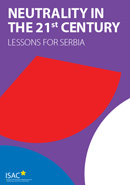NATO and European (permanently) neutral states - Neutrality is not an issue for NATO
NATO and European (permanently) neutral states - Neutrality is not an issue for NATO
Author(s): Jiri Kyrian
Subject(s): Politics / Political Sciences, Politics, International relations/trade, Peace and Conflict Studies
Published by: ISAC - Centar za međunarodne i bezbednosne poslove
Keywords: NATO; neutrality; international relations
Summary/Abstract: NATO was founded as a political-military alliance with the core task of collective defence. As such, logically it could not be neutral. However, it has always respected the neutrality of partner countries. When we speak about NATO, I would like to underscore its first adjective – it is a political -military organisation. In the alliance’s history the relative weight of these two dimensions was not always the same. During the Cold War, the military dimension kept more visibility and importance. However, after the fall of the Berlin Wall and the radical changes that have occurred in the Eastern camp, the political dimensions perhaps did not take the primary role, but it got new content and meaning. Neutrality and cooperation do not exclude each other. That has been the principle approach of NATO towards other countries since early 1990s, regardless of their foreign and security policy lines. Therefore, the Alliance has decided to extend the “hand of partnership” to the countries of former Eastern bloc. The sole thing that mattered was their willingness to cooperate.
Book: NEUTRALITY IN THE 21st CENTURY –LESSONS FOR SERBIA - ESSAY COMPENDIUM -
- Page Range: 83-85
- Page Count: 3
- Publication Year: 2013
- Language: English
- Content File-PDF

